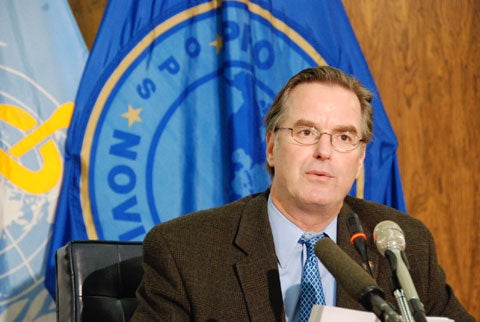
 PAHO Deputy Director Dr. Jon Andrus with updated information about the cholera outbreak in Haiti. A transcript of the press briefing can be found here.
PAHO Deputy Director Dr. Jon Andrus with updated information about the cholera outbreak in Haiti. A transcript of the press briefing can be found here.
Press Conference video
Click on the Image
Cholera Outbreak in Haiti
Jon Kim Andrus, MD
Deputy Director
Pan American Health Organization
16 November 2010
In Haiti, one encouraging development is the recent creation of an emergency operations center in the Presidential Palace.

The center has representation from several key government ministries, including water & sanitation, communications, health and finance, as well as representatives from UN agencies and other partners.
We believe this sends a clear message about the Haitian government's commitment and leadership at the highest level.
All of us in the international community should continue to constantly question and remind ourselves how we can best support the Haitian people and their government in its response to the crisis at hand.
We expect to see cases continue to increase and we expect to see increased geographical spread.
Over the weekend, cholera continued to spread through 6 departments in Haiti. We have reports of increased numbers of cases in the Artibonite, Central, North-West, North Departments, South and Ouest Departments.
For metropolitan Port-au-Prince, the nation's capital, six communes, or communities, have reported increases in cases, in particular, Cite Soleil and Petion Ville.
The rise in the number of cases in Cite Soleil is particularly worrisome to us because we know of its conditions of poverty, included crowded living conditions, poor sanitation, and lack of potable water.
So a major emphasis for PAHO/WHO right now is surveillance and risk assessment, so that we can continue to identify these "hot spots" where cases are increasing rapidly, and then we can use that knowledge to mobilize a fast response, including good case management, logistics and supplies, and social communication to educate people about how to care for those who become ill.
We also expect to see cholera cases in the Dominican Republic, and PAHO/WHO is working closely with the Dominican Republic Ministry of Health to prepare for any potential outbreaks there.
Given the experience of the 1991 epidemic it is likely that cholera will also spread beyond the island to other countries in the Americas.
Last week, PAHO/WHO and about four dozen international and nongovernmental partners issued a joint strategy with detailed plans for how to support efforts to control Haiti's cholera epidemic and to mitigate its impact.
The appeal is based on epidemiological modeling that projects about 200,000 cases over the next six to 12 months. Of these cases 20% of them will require intensive fluid rehydration and possibly antibiotics. These estimates will be re-assessed depending of the results of on-going field surveys that are being conducted. Other less severe, symptomatic cases would be treated as out-patients or at the community level.
The strategy details how PAHO/WHO and other international partners plan to help Haiti scale-up efforts to ensure access to treatment for infected people but also fundamental actions that will break the cycle of infection through improvements in water and sanitation and better hygiene practices by the population.
The main framework for the health component of the appeal is Haiti's National Cholera Response Plan. It aims to protect families at the community level with health promotion and improved case management, and also by reorganizing health services into new Cholera Treatment Centers and Cholera Treatment Units in already existing health facilities.
Clean water and sanitation are the main preventive measures that need to be in place to break transmission of cholera. These will require both health and water & sanitation partners to continue to work together to distribute such items as water purification tablets, hygiene kits, and potable water.
The strategy will require about $164 million in international funds to carry out. We are hopeful that the international appeal will be successful and that the cooperation of all organizations, with leadership from Haiti's government, will eventually turn the tide of the epidemic.
Thank you. I will stop now and take any questions.



